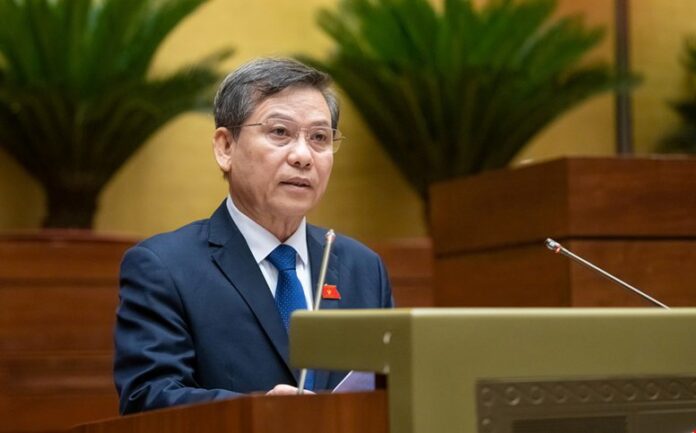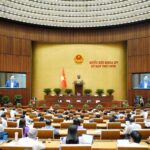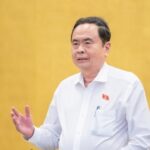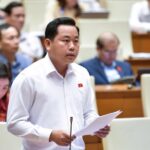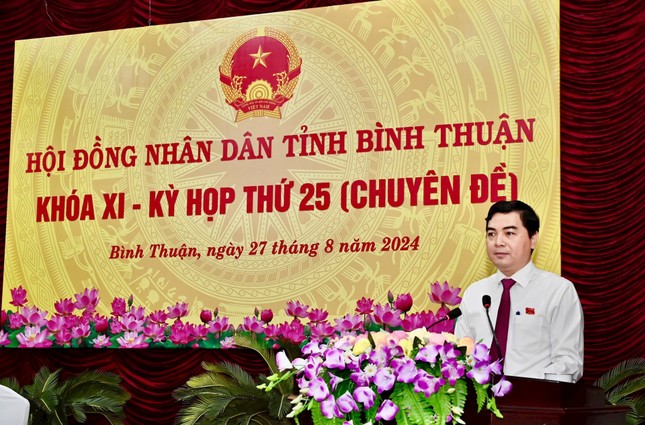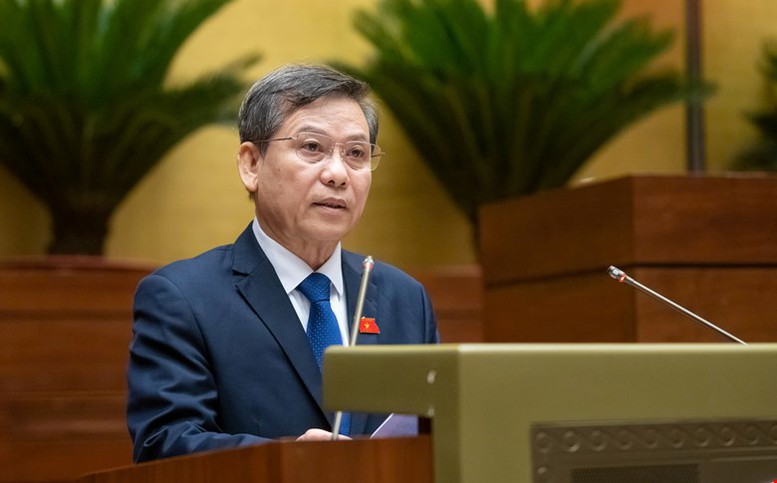
Chief Justice of the Supreme People’s Court Le Minh Tri presents the Proposal for the Law.
Continuing the agenda of the 9th session, the National Assembly listened to the presentation of the Proposal and the verification report of the draft Law amending and supplementing a number of articles of the Law on the Organization of the People’s Courts.
Presenting the Proposal, Chief Justice of the Supreme People’s Court Le Minh Tri emphasized that the draft Law has amended and supplemented the provisions on the organization of the court system towards terminating the operation of the High People’s Courts and the District-level People’s Courts; establishing the Regional People’s Courts; and transforming the specialized first-instance People’s Courts into specialized divisions within the Regional People’s Courts.
Accordingly, the model for the organization of the court system includes: the Supreme People’s Court; Provincial-level People’s Courts of provinces and centrally-run cities; and Regional People’s Courts (amending Clause 4 of the 2024 Law on the Organization of the People’s Courts).
Regarding the tasks, powers, and organizational structure of the Regional People’s Courts, the District-level People’s Courts will be restructured into Regional People’s Courts. This includes the cities, towns, and provincial municipalities under the authority of the centrally-run cities.
Amending and supplementing the provisions on the organizational structure of the Regional People’s Courts, the draft Law stipulates that the Regional People’s Courts will have specialized divisions, including: Criminal Court, Civil Court, Administrative Court, Economic Court, Family and Juvenile Court.
The draft Law also supplements provisions for the establishment of Bankruptcy Courts and Intellectual Property Courts in some Regional People’s Courts located in Hanoi, Danang, and Ho Chi Minh City. The territorial jurisdiction of these specialized courts will be defined by the National Assembly’s Standing Committee. The Supreme People’s Court plans to organize three Bankruptcy Courts and two Intellectual Property Courts in these regions.
The arrangement of specialized Bankruptcy and Intellectual Property Courts in some Regional People’s Courts located in major provinces and cities, which are the country’s economic and financial centers, is necessary to improve the quality of handling and adjudicating such cases. It also demonstrates Vietnam’s commitment to seriously enforcing intellectual property rights and improving the investment and business environment to strongly attract foreign investment.
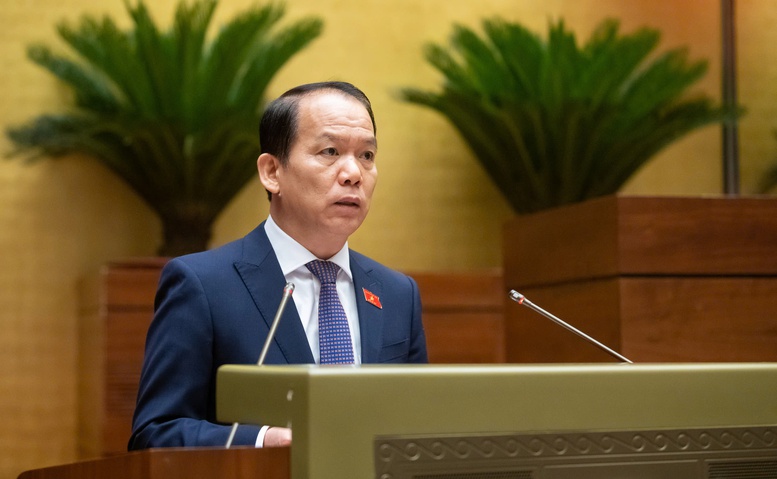
Chairman of the National Assembly’s Committee for Legal and Judicial Affairs, Hoang Thanh Tung, presents the verification report on the draft Law.
Increase the number of Supreme People’s Court Judges to 23-27
The verification report on the draft Law, presented by Hoang Thanh Tung, Chairman of the National Assembly’s Committee for Legal and Judicial Affairs, clearly states the Committee’s agreement on the necessity to amend and supplement a number of articles of the Law on the Organization of the People’s Courts. The content of the draft Law is consistent with the Party’s guidelines and policies and ensures compliance with the Constitution and the legal system.
The scope of amendments and supplements focuses on provisions related to the reorganization and streamlining of the court system’s structure and the tasks and powers of the People’s Courts under the three-tier model.
The Committee agrees with the proposed organization of the People’s Courts, comprising the Supreme People’s Court, Provincial-level People’s Courts, and Regional People’s Courts. (The Military Courts remain unchanged according to the current Law). It also agrees with the termination of the High People’s Courts and District-level People’s Courts.
The Committee generally agrees with the redefinition of tasks and powers of each level of courts. Specifically, the Supreme People’s Court will be assigned the additional task of handling appeals and protests against non-effective verdicts and judgments of Provincial-level People’s Courts in criminal cases (a task previously handled by the High People’s Courts). It will also handle requests for retrials and reviews of effective verdicts and judgments of Provincial-level People’s Courts (also previously handled by the High People’s Courts).
Provincial-level People’s Courts will handle appeals and protests against non-effective verdicts and judgments of Regional People’s Courts in all cases. They will also handle requests for retrials and reviews of effective verdicts and judgments of Regional People’s Courts (a task transitioned from the High People’s Courts).
Regional People’s Courts will handle first-instance criminal cases and all civil, administrative, and other cases under their jurisdiction.
These amendments and adjustments to the tasks and powers of the People’s Courts are in line with the direction of enhancing decentralization and delegation of authority. They are also consistent with the current organizational structure, resources, and capacity to fulfill assigned tasks. These changes ensure the normal operation of the three-tier court system without interruption.
The Committee agrees with the establishment of Appellate Divisions within the Supreme People’s Court to handle new tasks related to appeals against non-effective verdicts and judgments of Provincial-level People’s Courts in criminal cases.
There is basic consensus on the proposal to establish an Economic Division in the Regional People’s Courts, and Bankruptcy and Intellectual Property Divisions in some Regional People’s Courts located in major provinces and cities. These are centers of economic and financial activities and are facing increasing demands for commercial and intellectual property dispute resolution, as well as bankruptcy cases. These types of cases are often complex and require judges and personnel with specialized knowledge and expertise.
The Committee basically agrees with the proposal to increase the number of Supreme People’s Court Judges from 13-17 (as per the current Law) to 23-27. This increase in personnel will ensure the quality and timely handling of the additional tasks related to retrials and reviews transitioned from the High People’s Courts.
The Committee generally agrees with the proposed amendment to the conditions for considering and appointing Supreme People’s Court Judges in special cases by competent authorities. The candidates for appointment must be current judges of the People’s Courts with at least five years of experience as Directors of specialized departments of the Supreme People’s Court. The number of people appointed under these conditions should not exceed 10% of the total number of Supreme People’s Court Judges.
This amendment is necessary to build a contingent of Supreme People’s Court Judges who are excellent in professional and specialized knowledge, politically steadfast, morally virtuous, professionally responsible, impartial, and professional. These qualities are in line with the requirements set by Resolution 27-NQ/TW.
A Proposal to Adjust Excise Tax Rates for Select Products and Commodities
The proposed revisions to the Special Consumption Tax Law offer a nuanced approach to taxation. Alongside exempting smaller air conditioners from special consumption tax, the draft law addresses nuanced scenarios, such as exported goods that have already incurred special consumption tax being returned from abroad. Additionally, it proposes adjustments to tax rates for pick-up trucks and a revised plan for implementing tax rates on alcoholic beverages from 2027 onwards.
“Proposal to Merge Provincial-Level Administrative Units: A Comprehensive Reform for Efficient Governance”
The National Assembly will discuss a range of critical issues at its 9th session, including resolutions on mechanisms and policies to foster private economic development. Additionally, a pilot scheme will be proposed, offering special mechanisms and policies to invest in developing the railway system. A proposal for the merger of provincial-level administrative units is also on the agenda, alongside other significant matters.
The Ultimate Guide to Start-up Success: Surviving the First 3 Years Without a Salary, Living in a Warehouse
Douglas Tan, the charismatic and visionary entrepreneur, founded Magix after facing numerous setbacks in his pursuit of career re-entry. Despite possessing impressive credentials, expertise, and experience, his journey began with a series of unsuccessful attempts to reintegrate into the workforce.

